Real Madrid eye statement Champions League victory amid shifting landscape of European football
For a club shaped by its glorious past, Real Madrid are having to adjust to the present while building towards a new future, Miguel Delaney writes

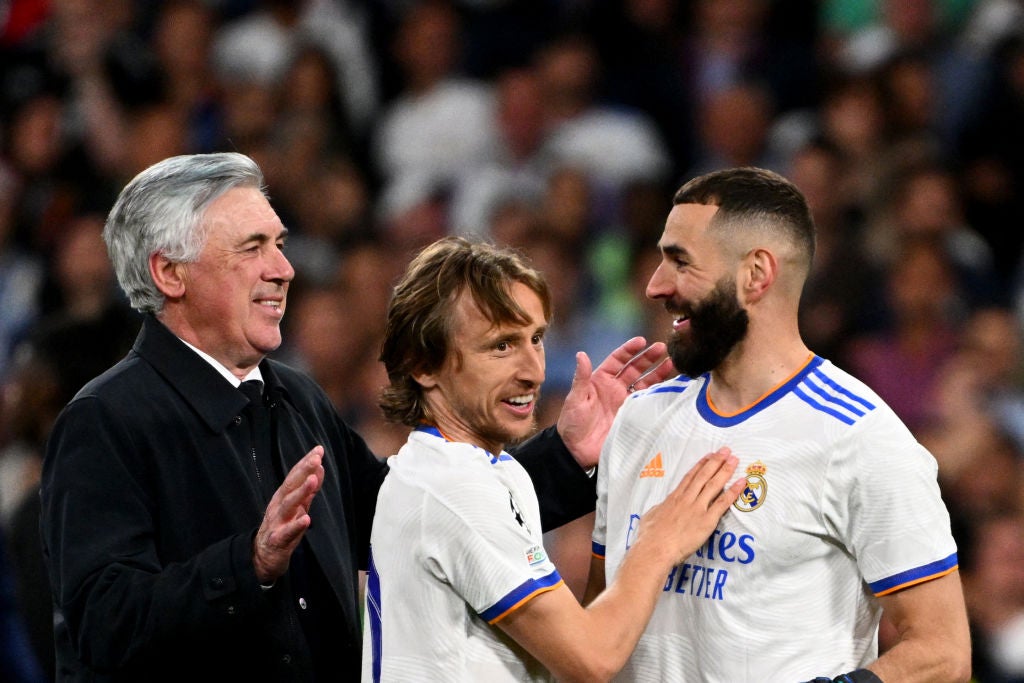
Your support helps us to tell the story
From reproductive rights to climate change to Big Tech, The Independent is on the ground when the story is developing. Whether it's investigating the financials of Elon Musk's pro-Trump PAC or producing our latest documentary, 'The A Word', which shines a light on the American women fighting for reproductive rights, we know how important it is to parse out the facts from the messaging.
At such a critical moment in US history, we need reporters on the ground. Your donation allows us to keep sending journalists to speak to both sides of the story.
The Independent is trusted by Americans across the entire political spectrum. And unlike many other quality news outlets, we choose not to lock Americans out of our reporting and analysis with paywalls. We believe quality journalism should be available to everyone, paid for by those who can afford it.
Your support makes all the difference.There has been one message that Florentino Perez has been especially keen to convey ahead of Real Madrid’s 17th Champions League final. That is to show Kylian Mbappe what he is missing.
The announcement of the French star’s signing ahead of a Paris final was intended to be a key part of the club’s build-up, fostering an even greater feeling that glory was inevitable. That was scuttled, and it has left the club scrambling – not least for a new signing.
Carlo Ancelotti is too much of a football man for such machinations, and too focused on his team, but he has told Perez it’s just one more setback to be overcome. That fits a theme, that the manager so pointedly asserted after the semi-final.
“I don’t think anybody – anybody – thought Madrid would play another Champions League final this season,” Ancelotti said, in a rare show of strong emotion. “And we’re there.”
That’s no empty statement, or a Jose Mourinho-type attempt to talk up his own impact. It’s true.
Very little about Madrid’s season suggested they would get this far. Very few people thought otherwise – not least Perez. He has at various points been preparing to use Champions League elimination as an excuse to sack Ancelotti at the end of the season. That was still a prospect right up to the second leg against Manchester City.
The Italian is after all a manager that no other big club had wanted at this point of his career, who had been brought in from Everton last summer, because no other acceptable name was available. He has also been overseeing a squad very much in transition, as evidenced by the absence of any key players who are in the prime of their careers. Madrid are a mix of some promising talent and ageing stars, with the two best players aged 34 and 36, respectively.
It is undeniably a worse team than they had in 2018. Only further reflecting this regression, there is the fact they were never considered the favourites in any of their knock-out ties. That was often the case right up to the final few minutes of the games, of course.
It is something else that is so symbolic about this run. Madrid faced all of what Perez describes as “the petroclubs” – Paris Saint-Germain, Chelsea, City – whose financial superiority has pushed the club president into the Super League plan. That farce of a project should make Madrid more hard to warm to than ever and yet – as Ancelotti might put it – there they were, beating them all in inspiringly epic circumstances.
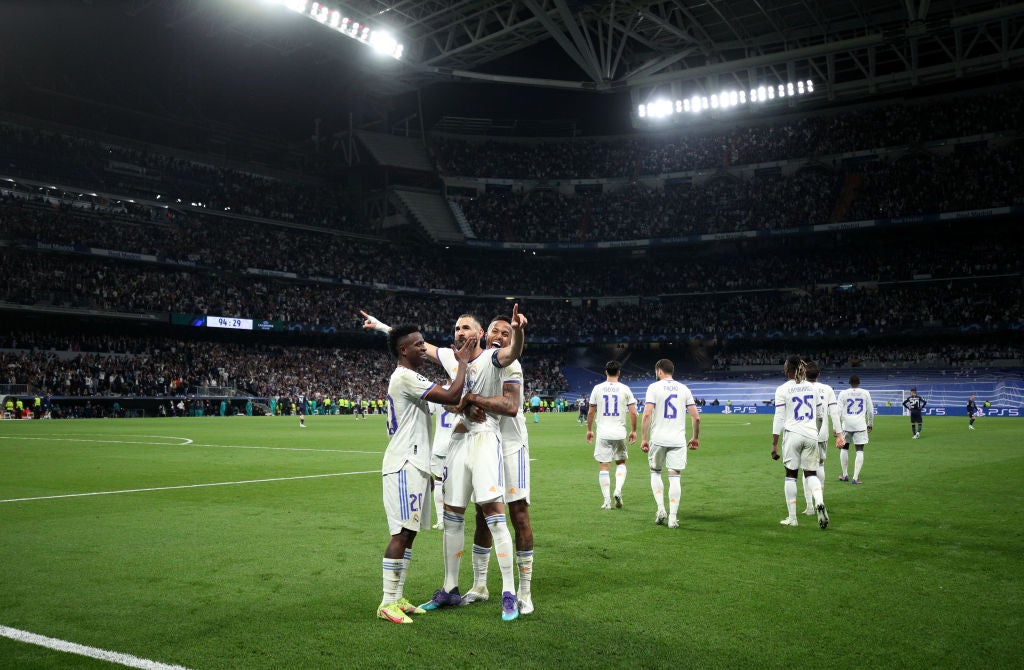
It has meant the story of this Champions League season, by far, has been the defiance of Madrid.
That is a very distinctive type of defiance, too, driven by two different identities.
On one side, there is obviously Madrid’s idealised image of themselves, as the Champions League royalty. This is their throne, their rightful place. This was something that Ancelotti so deftly got Karim Benzema to transmit at half-time of the second leg against Paris Saint-Germain.
It was a rare moment when the French star decided to speak in front of the squad. Benzema told his teammates to keep focused, and keep attacking.
“Because PSG will panic,” the forward astutely said. “We’ve seen it before.”
Benzema was well aware that PSG’s own Champions League history was based on failure, which meant their players feared defeat, while Madrid – as always – believed they could win. It was much the same with City in the semi-finals. The contrast went a long way to setting the decisive psychology of the ties.
And yet this overarching defiance was necessarily driven by an unprecedented sense of Madrid as underdog.
That was made so clear, in a remarkable spectacle of its own, in the two hours before the semi-finals. Tens of thousands of Madrid fans gathered around the Bernabeu early to greet the team bus, in a very visible show of the club’s historic status as giants, but began chanting a refrain that is the preserve of Spain's smaller teams.
“Si se puede.”
Yes, we can.
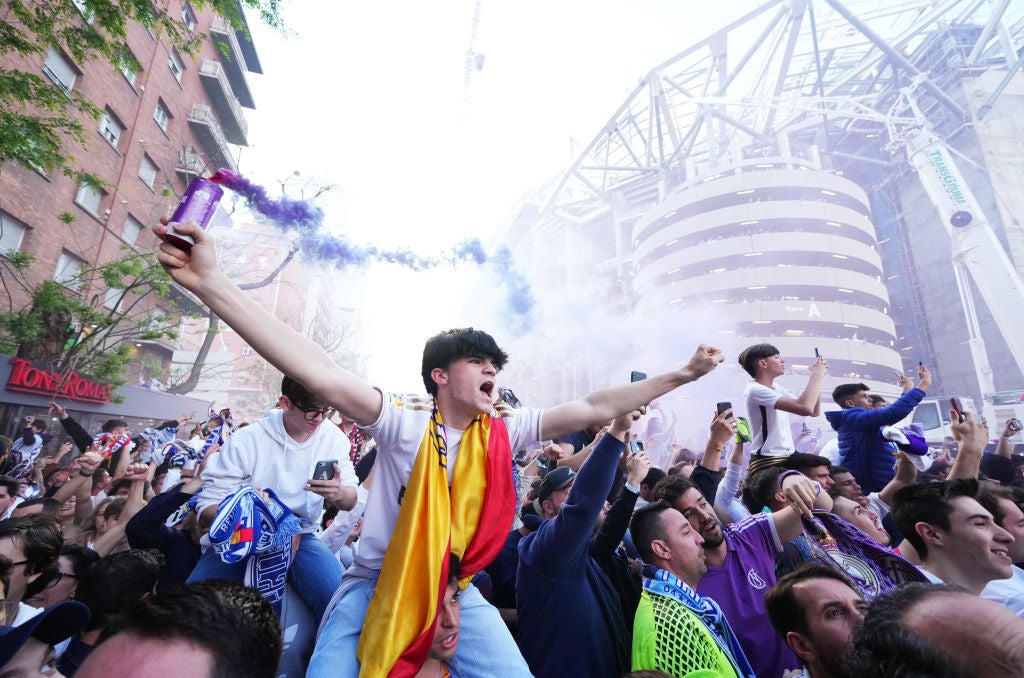
It had been heard in both of the previous ties, but took on a new power for the semi-final, amplified by the warm conditions that only this time of year there – and this type of night – can bring. The Bernabeu itself is more of a symbol of where Madrid are than ever before.
It is under reconstruction, with that work still so visible, amid plans for a spectacular new roof. The older normal seats are not going to be changed, though, reflecting a club keen to promote a gleaming image without the deeper wealth to really do it all any more. There are literal covers on some of the lower rows, to hide the work being done for a retractable pitch.
It means the experience of the stadium on this season’s great European nights hasn’t been as spectacular as it would be, but it’s still standing, still staging the biggest games.
Much like the team.
It adds to the overall sense of an antique being given modern touches.
So it was with Ancelotti's team.
There has been a throwback element to their approach, a sense of “deluxe cup football” to quote one source. Ancelotti simply doesn’t impose the ideological systems of the modern game. It is why Bayern Munich were shocked by how he worked after Pep Guardiola left, and why the 62-year-old was at a club like Everton.
Perez had been left infuriated by that approach after the insipid 1-0 first-leg defeat to PSG in the last 16. This wasn’t how Madrid were supposed to play in Europe. Ancelotti would argue it was how he had to play, given his squad compared to PSG’s.
That defensive game was an astute calculation, because it set Madrid up for the second leg. Ancelotti’s set-up may mean his teams can’t be as good as those of the elite managers over the long term, but it simultaneously ensures that they can give them a proper match in the biggest games.
The Italian has an instinct for rousing players at the right moments, as well as a feel for such occasions. His overall tactics may far from the best in the sport, but his in-game decisions are right up there.
Stars have been left hugely impressed by the timing of his substitions, and their effect. "He is possibly the best in the world at subs," has been one refrain. You couldn’t have a better illustration of that than the brave decision to bring off Luka Modric for Eduardo Camavinga against City, and the introduction of Rodrygo against both the English champions and Chelsea.
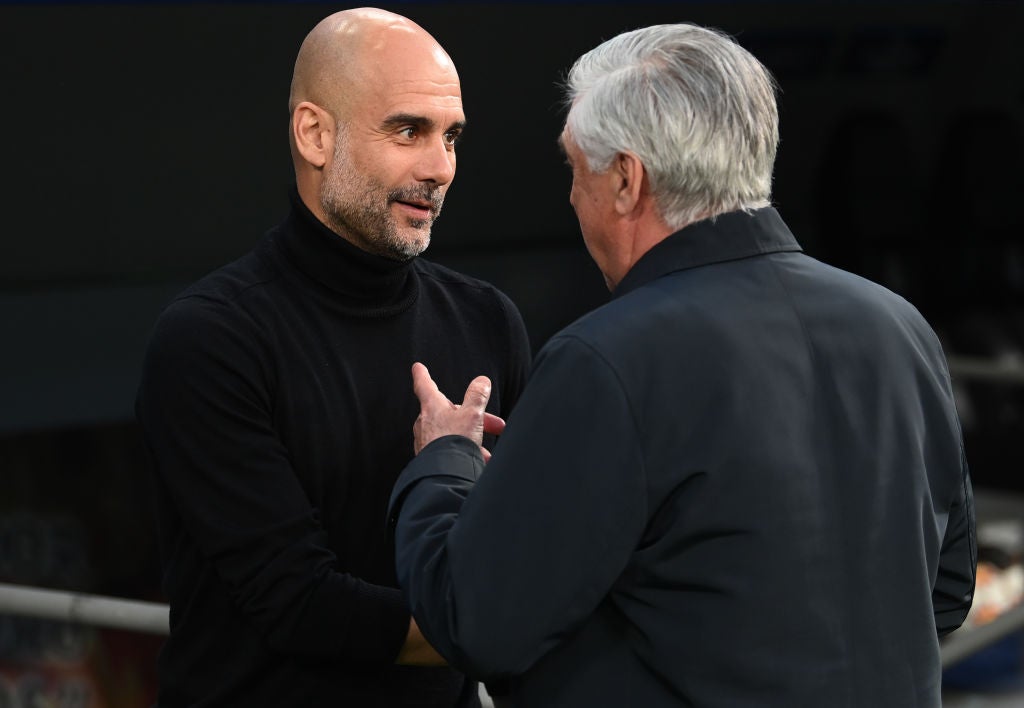
The Madrid players see Ancelotti as superior to Zinedine Zidane and even better than Guardiola in certain aspects.
He has “an emotional intelligence Pep could never have”, in the words of one figure who had worked under both.
The old-fashioned family atmosphere that Ancelotti has created only adds to that, especially when real unity has been required.
One of the images of this Champions League season has been Toni Kroos and Marcelo consulting with their manager on the sideline amid the intensity of the City second leg, Ancelotti keen to get the thoughts of senior players.
It was a visualisation of how the team currently works. It is figuratively and literally a family, given his son David is the assistant who looks after most of the tactical sessions, and son-in-law, Mino, the nutritionist. Ancelotti has also brought back the popular conditioning coach, Antonio Pintus. Pintus has been credited for the physical resilience of the squad, and especially the everlasting influence of the 34-year-old Benzema and 36-year-old Modric.
They have both changed training regime and thereby reached new levels of performance. Benzema has been the dominant player in this Champions League campaign, with match-winning performance after match-winning performance. Modric, almost as influential in general play, has offered perhaps the moment of the season with that audacious pass for Rodrygo against Chelsea.
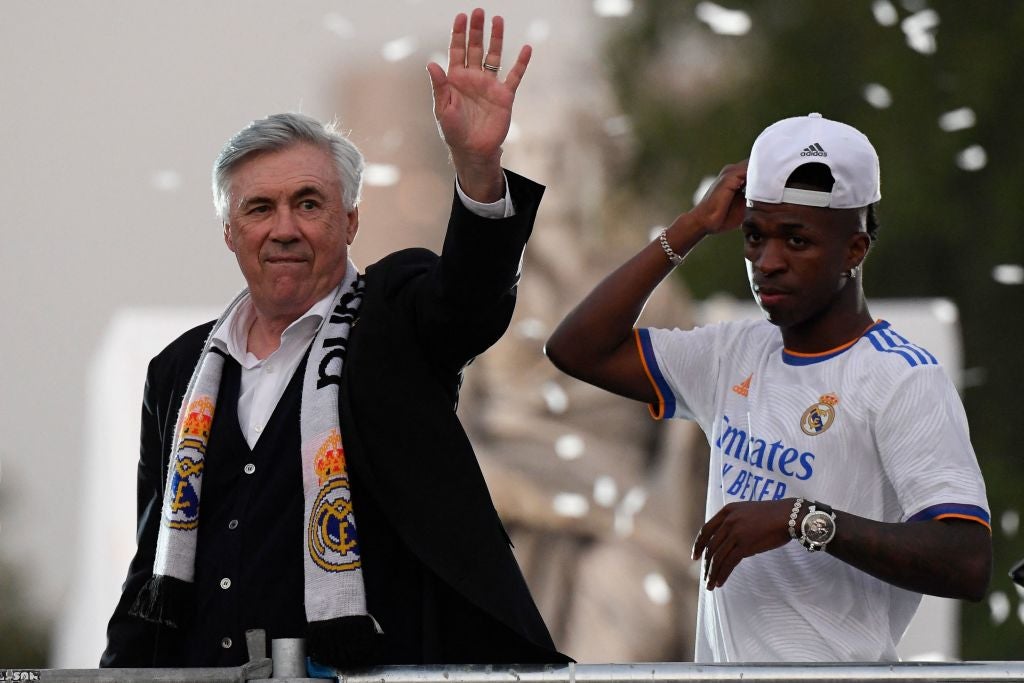
Young potential like Vinicius have meanwhile better realised some of their talent under Ancelotti, as if released by his nurturing man-management. The Brazilian's evisceration of Fernandinho in the semi-final first leg was another crucial turning point over this run.
The manner in which Guardiola so melodramatically fell to his knees at that exact moment – illustrating how important he knew a challenge at that second was – similarly emphasised how, in this competition, any system can be so instantaneously undone by individual inspiration. Some of it is luck and circumstantial, sure, but it can no longer be seen as fluke.
It almost comes from a primal conviction in such games, that Madrid are just better. The influence of Benzema, Modric and Kroos is also why the teams don’t need much by way of tactical instruction.
It is why some describe this Madrid as “almost being a 1950s or 1990s team winning in 2022”.
This is all as Madrid try to adapt to the greater challenges of football in 2022.
Liverpool consequently serve as symbolic opposition, too, but in the opposite manner to the three petroclubs they have faced. Madrid have been looking to replicate the Anfield way in order to challenge those petro-clubs.
The Bernabeu football staff have studiously noted how Jurgen Klopp’s side have themselves defied economic realities to keep pace with City, while picking a series of players that rise to better levels, and become the sort of stars that Perez would want to sign.
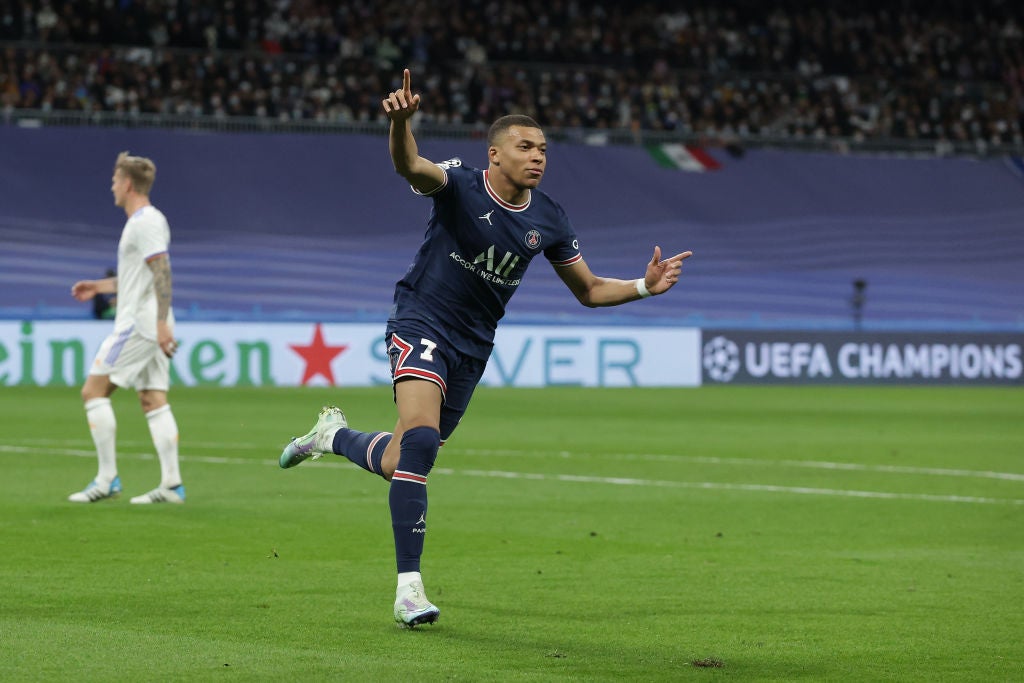
The Mbappe saga has meanwhile illustrated that Madrid can’t sign those players in the old ways any more.
So, they have decided to cut out the middle club, so to speak. Madrid have sought to replicate Liverpool by signing stars before they become stars. The overtures to Michael Edwards were a natural move in this.
Madrid's system isn’t currently as scientific as Liverpool, it must be said. Much like Ancelotti himself, though, it is astute and intuitive. “They’re like a clever version of Manchester United,” one agent explains. While Madrid are very much a “presidential club”, with Perez having final say on all major decisions, the football intelligence underneath is largely left to get on with their work and guide overall strategy.
The real club hierarchy are chief executive Jose Angel Sanchez, commercial executive Begona Sanz and – only increasing in power – head of recruitment Juni Calafat. This has made Madrid streamlined, and very well run.
Most recruitment decisions tend to be right, with any wrong decisions quickly corrected. There is no needless investment in players no longer of use. There is less room for emotional hang-ups. Sergio Ramos and Raphael Varane were willingly, and ruthlessly, discarded. Their form since has also vindicated those exits. This is now a club for the future.
The influence of Calafat points to how some of this goes back further than Mbappe, to the failure to sign Neymar in 2013. Perez, wowed by the traditional idea of Brazilian talent in that simplistic way he views the game, was insistent they never miss out on the next Neymar again.
It meant they turned to Calafat, a former Brazilian television commentator who had excellent contacts and an even better eye for a player. He has been responsible for a series of signings that are essentially investments, in Vinicius, Rodrygo and Lucas Silva, as well as players like Camavinga and –potentially – Aurelien Tchouameni.
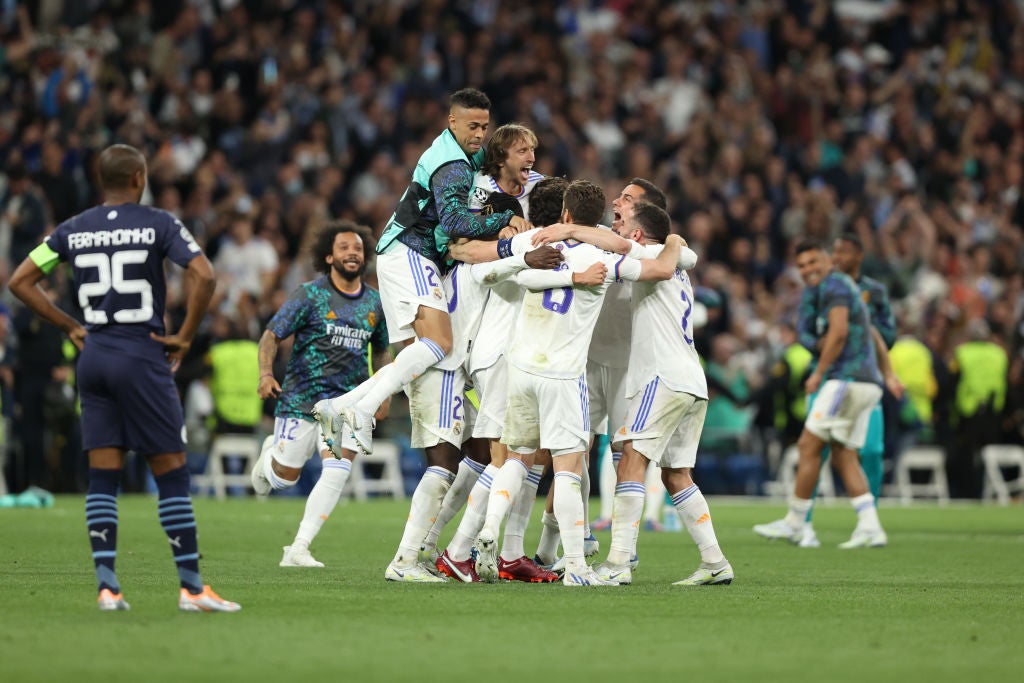
This is Madrid’s recruitment strategy going forward. It is not “Zidanes and Pavones”, as it was in the Galactico years, but the Pavones who might become Zidanes. The wasteful pre-pandemic signing of Eden Hazard is very much one from a different world and a different era.
The new recruitment strategy also fits into a grander commercial strategy, albeit a somewhat rudimentary one.
Madrid have noted how the youngest generation of football fans initially consume the sport through computer games, which means they often become more attached to individuals rather than clubs. These are the lucrative new markets the clubs are seeking to exploit. It is why they seek to retain 50 per cent of image rights in any deal, something that did prove obstructive in Mbappe negotiations. That is one of a few reasons why nothing was ever signed.
Mbappe was of course supposed to be central to this strategy. He is the ultimate young star in the game.
It does represent more than a setback, since Mbappe was also supposed to be the future of the club. His decisions changes the build-up to this game – but also the meaning.
Victory would be a message to the whole of Europe, as well as Mbappe.
The club may not be what they were, and this is not a vintage Madrid. But it says something if they can still be European champions, as they attempt to write a distinctive new part of the club's story. It no longer demands deference to royalty. It is about defiance.
Join our commenting forum
Join thought-provoking conversations, follow other Independent readers and see their replies
Comments